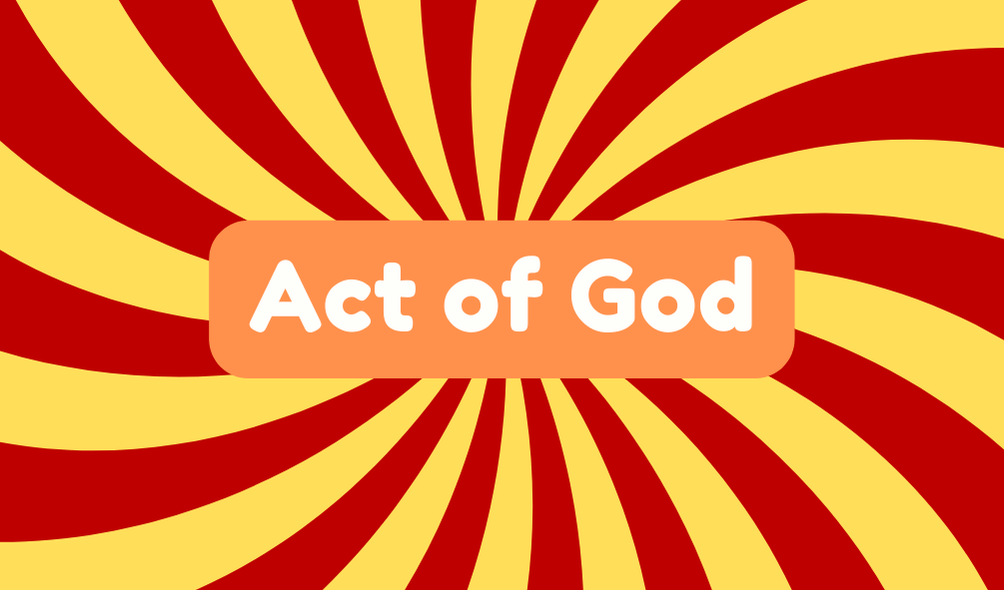You might be surprised to learn that the term “Act of God” has significant implications in both legal and insurance contexts, referring to unpredictable natural events like earthquakes or floods. This phrase originates from biblical scripture, particularly in Matthew 5:45, and over time, it became embedded in legal terminology. When property is damaged by such unforeseen forces, you often see limitations on liability. Yet, the relevance of this term stretches far beyond its historical roots, raising questions about accountability and prevention. You may wonder how this concept impacts modern society today.
What Does It Mean?
When discussing the meaning of “act of God,” you’re really referring to events beyond human control that are often unpredictable and devastating. These uncontrollable forces, like hurricanes and earthquakes, remind us of nature’s raw power. It’s essential to recognize that while we may feel equipped to manage our lives, there are moments when Mother Nature has other plans. Acknowledging this helps us prepare better, both personally and professionally. In legal settings, the term often protects parties from liability when natural disasters strike. However, it also begs the question of how often we rely on this label, rather than addressing the underlying factors contributing to these disasters. Balancing innovation with a realistic understanding of these events is key to steering our changing world.
Synonyms
Understanding the meaning of “act of God” naturally leads to exploring its synonyms, which help convey the concept of unpredictable, uncontrollable events. Here are some key alternatives to think about:
- Natural Disasters – Events like hurricanes or earthquakes that occur without our control.
- Uncontrollable Events – Incidents in life that can’t be prevented or anticipated.
- Divine Intervention – A term reflecting the belief that higher powers influence natural occurrences.
These synonyms capture the essence of situations we face when nature decides to release its fury. While we might want to exert control over life, the reality is that some events remain beyond our reach, reminding us of the forces at play in our world. Recognizing these terms can enhance your understanding of the complexities we encounter.
Example of Sentences
How can we illustrate the concept of “acts of God” through relatable scenarios? Here are three examples:
- Natural Disasters: When a hurricane causes flooding, you see how unpredictable forces can dramatically alter lives.
- Legal Implications: If an earthquake damages your business, courts may classify it as an act of God, affecting liability and insurance claims.
- Insurance Context: Many policies include clauses that release you from liability during natural disasters, showing the term’s critical legal role.
These examples highlight that acts of God aren’t just unfortunate events; they’re events that demand legal recognition and responsibility. Recognizing their significance can better prepare you for the unexpected challenges they bring.
Origin
The concept of “acts of God” traces back to biblical references, with the first notable mention found in Matthew 5:45, where it highlights divine control over natural forces. This phrase holds significant historical weight and has shifted from a strictly religious context to a broader legal application.
| Biblical Context | Historical Significance |
|---|---|
| First used in religious texts | Adopted in law by the 19th century |
| Divine intervention depicted | Influential in insurance matters |
| Noted in Matthew 5:45 | Critical in liability discussions |
It’s fascinating to see how a term deeply rooted in spiritual belief has evolved into a legal term, showcasing society’s shifting perceptions on humanity’s control over nature.
Collocations
With its roots in biblical texts, the term “acts of God” has become a significant part of legal language, leading to various collocations that enhance its meaning. These collocations often illustrate the legal implications surrounding natural disasters and the responsibilities of parties involved. Here are three key examples:
- Acts of God clause – A section in contracts outlining protection against liability for unforeseen events.
- Insurance coverage for acts of God – Policies that safeguard individuals from losses due to natural disasters.
- Force majeure as acts of God – Legal terms used to denote unpreventable events affecting contractual obligations.
Understanding these collocations can help you navigate discussions on liability and protect your interests against the unpredictable nature of our world.
How to Use in Everyday Language
Natural unpredictability shapes our lives, and understanding “acts of God” can help you communicate effectively in everyday situations. These terms pop up in practical applications like insurance claims or when discussing unexpected weather events. For instance, if a sudden storm disrupts your travel plans, you might say, “That’s just an act of God.” This makes it clear you’re referring to something beyond your control. Everyday examples include discussing natural disasters or explaining why a project’s timeline shifted unexpectedly. By using this phrase, you acknowledge the limitations of human influence over nature. However, it’s essential to remember that relying too much on this term might let us evade responsibility for our own decisions amidst life’s chaos.
Why Is It Still Relevant Today?
Often, people underestimate the relevance of “acts of God” in today’s fast-paced world. With climate change causing more frequent and severe natural disasters, the term has significant legal implications. You should recognize that these events can disrupt lives and economies, leaving both individuals and businesses vulnerable. Contracts often include clauses about acts of God to protect parties from unforeseen liabilities, but is that enough? As we innovate and adapt to a changing environment, it’s vital to stay aware of how climate change is reshaping our legal landscapes. Ignoring this reality may leave you unprepared when faced with the power of nature. Understanding acts of God isn’t just an academic exercise; it’s essential for maneuvering today’s complexities responsibly.
Frequently Asked Questions
How Do Acts of God Differ From Human-Caused Disasters?
Acts of God stem from natural phenomena, occurring unpredictably, while human-caused disasters often result from negligence. You’ll find that these differences shape our responses and strategies for risk management in innovative ways.
Can Acts of God Be Predicted in Any Way?
Can you really predict acts of God? While scientific forecasting helps with understanding natural phenomena, the unpredictable nature of these events means certainty often remains elusive, leaving us to navigate their impacts with resilience and adaptability.
What Insurance Policies Cover Acts of God?
When you’re exploring insurance coverage, look for policies that specifically include natural disasters. Extensive plans often protect against events like floods and earthquakes, ensuring you’re financially safeguarded from unpredictable forces that can disrupt your life.
Are Acts of God Considered in Environmental Law?
Yes, acts of God, like natural disasters, play a significant role in environmental law. You’ll find that understanding their legal implications helps you navigate liability issues and innovation in disaster preparedness and response strategies.
How Does Climate Change Influence Acts of God?
You might think Mother Nature’s throwing a tantrum, but climate change’s actually reshaping weather patterns. With unpredictable storms and wildfires, it’s turning natural disasters into a thrilling, albeit alarming, rollercoaster ride for everyone involved.







